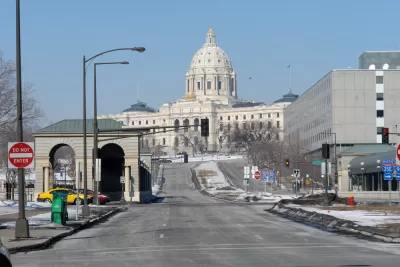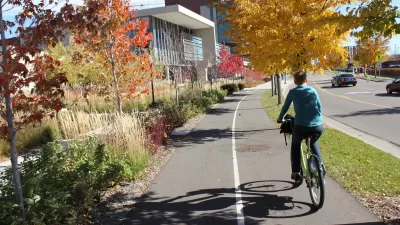Minneapolis and St. Paul are celebrating their newfound local control on matters of traffic safety be reconsidering the speed limits on city-owned streets and roads.

"The compromises forged at the end of last year’s [2019] legislative session included a new law that allows Minnesota cities to set their own speed limits on city streets," according to an article by Bill Lindeke, and St. Paul is one of the cities moving to take advantage of their newfound local control.
"In both Minneapolis and Saint Paul, the next step is one where cities, on their streets anyway, can begin to set their own pace, and use street regulations to accomplish civic goals," explains Lindeke.
The article includes an explanation of the 85th percentile rule, describing the status quo for determining speed limits as perverse.
Especially in cities, the 85th percentile rule can work in perverse ways. At its extremes, the principle rewards drivers who speed by changing the rules. If enough people break the law, the rule simply changes the law to accommodate them. For decades, that’s been how speed limits were set throughout the state.
In St. Paul, according to Lindeke, engineers are considering a new process for thinking about which speed limits are appropriate for which streets in the absence of the 85th percentile's precedent.
As reported from Minneapolis earlier this year, St. Paul is not alone in seeking lower speed limits now that the state has relaxed its powers of preemption.
FULL STORY: St. Paul is rethinking its speed limits

Maui's Vacation Rental Debate Turns Ugly
Verbal attacks, misinformation campaigns and fistfights plague a high-stakes debate to convert thousands of vacation rentals into long-term housing.

Planetizen Federal Action Tracker
A weekly monitor of how Trump’s orders and actions are impacting planners and planning in America.

In Urban Planning, AI Prompting Could be the New Design Thinking
Creativity has long been key to great urban design. What if we see AI as our new creative partner?

Massachusetts Budget Helps Close MBTA Budget Gap
The budget signed by Gov. Maura Healey includes $470 million in MBTA funding for the next fiscal year.

Milwaukee Launches Vision Zero Plan
Seven years after the city signed its Complete Streets Policy, the city is doubling down on its efforts to eliminate traffic deaths.

Portland Raises Parking Fees to Pay for Street Maintenance
The city is struggling to bridge a massive budget gap at the Bureau of Transportation, which largely depleted its reserves during the Civd-19 pandemic.
Urban Design for Planners 1: Software Tools
This six-course series explores essential urban design concepts using open source software and equips planners with the tools they need to participate fully in the urban design process.
Planning for Universal Design
Learn the tools for implementing Universal Design in planning regulations.
Gallatin County Department of Planning & Community Development
Heyer Gruel & Associates PA
JM Goldson LLC
City of Camden Redevelopment Agency
City of Astoria
Transportation Research & Education Center (TREC) at Portland State University
Jefferson Parish Government
Camden Redevelopment Agency
City of Claremont





























